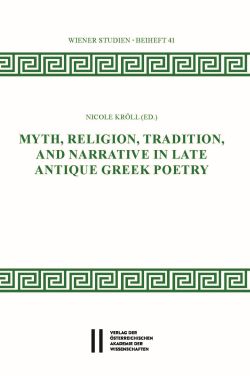
Myth, Religion, Tradition, and Narrative in Late Antique Greek Poetry, pp. 27-44, 2020/09/22
Der Band zeigt die vielfältigen Themen griechischer Dichtung in der Spätantike. In den Werken des Nonnos von Panopolis und in der „Ekphrasis“ des Johannes von Gaza wirken heidnische und christliche Themen zusammen, die Dichtungen des Georgios Pisides werden vor dem Hintergrund spätantiker Philosophie gelesen und die Autobiographien Gregors von Nazianz als literarische Ausdrucksformen. Analysiert werden die ekphrastischen Erzähltechniken bei Quintus Smyrnaeus und die Figurenkomposition bei Kollouthos, zudem wird Lykophron als Quelle für die „Dionysiaka“ des Nonnos beleuchtet. Gestalten der Mythologie begegnen sich ebenso wie Zyklopen und Elefanten, und spätantike Epigrammatik wird im kulturellen und literarischen Umfeld der Zeit kontextualisiert.
…
The volume shows the manifold themes of Greek poetry in Late Antiquity. Pagan and Christian concepts merge in the works of Nonnus of Panopolis and in the “Ekphrasis” of John of Gaza, the poems of George of Pisidia are read against the background of late antique philosophy and the autobiographies of Gregory of Nazianzus as literary forms of expression. The ekphrastic narrative techniques of Quintus Smyrnaeus and the composition of characters in Colluthus are analyzed, and Lycophron is proved as another source of Nonnus’ “Dionysiaka”. The contributions also deal with mythological characters, cyclopes and elephants, and late antique epigrammatic poetry is contextualized in the cultural and literary environment of the time.